 Left to right: Drs. Fritz Roth, Doug Fowler, and Clare Turnbull
Left to right: Drs. Fritz Roth, Doug Fowler, and Clare Turnbull
NOTE: The fifth annual Mutational Scanning Symposium was held June 13, 14, and 16 in Toronto and online. Organizer Dr. Fritz Roth and keynote speakers Drs. Clare Turnbull and Doug Fowler offer their observations and insights of the event and suggestions for the 2023 symposium to be held in the U.K.
Which presentation(s) or panel discussion(s) did you find the most revelatory?
Clare Turnbull: There were two that stood out for me: Jochen Weile, University of Toronto, “Translating multiplexed variant effect assays into evidence codes for clinical interpretation;” and Shawn Fayer, University of Washington, “Closing the gap: Systematic integration of multiplexed functional data resolves variants of uncertain significance in BRCA1, TP53, and PTEN.”
Fritz Roth: To pick one among many.... I really enjoyed Kresten Lindorff-Larsen's description of how combining two kinds of variant effect maps, one for stability/abundance and one for overall function, can point you to amino acids that are key for the catalytic function of an enzyme. If only he hadn't pointed out the left-handed helix in our agenda....
Doug Fowler: Clare's talk was wonderfully clarifying for me. I didn't understand how much had changed recently in the clinical variant interpretation world. The context she provided helped me think more clearly about how our work fits in. Also, Julia Domingo's presentation on the doubledeepPCA approach and associated modeling from the Lehner group were very exciting. It is clear that this approach could scale and be very informative.
What impressed you about the young (under age 35) scientists at the symposium?
Turnbull: There was amazing quality of outputs and depth of considered knowledge on their specialist areas. Really high-quality young scientists.
Roth: The kids are alright! Although I am personally still amazed that we can aspire to test the “overall” functional impact of every possible variant in every protein and non-coding element, many of the younger scientists are already clearly setting their sights higher. They are actually aiming to determine the mechanism by which every variant makes its functional impact.
Fowler: The level of interaction. I had many excellent conversations with younger scientists. Engagement in the virtual content was also really fantastic. In particular, the virtual poster session was very well attended, with people interacting and discussing their science. I think – and fervently hope – that this represents a durable shift in attitudes. Virtual content makes our meetings more equitable and also has huge climate change benefits.
Did the symposium meet – or exceed – your expectations? Why?
Turnbull: Exceeded. The diversity of talks and having a well-constructed agenda. Also, the banquet was a really beautiful event and gave a very personal touch.
Roth: Given the “dumpster fire train wreck” expectations I had as an organizer for a hybrid international meeting during a pandemic, we only had minor issues that were quickly fixed. We also heard amazing science, saw new collaborations formed, and had a great time. What more can you ask?
Fowler: I had very high expectations, because I love this meeting. They were completely exceeded! From super high-quality talks, to fantastic discussions with colleagues, to the idyllic banquet – complete with a harpist – the meeting was a smashing success.
What are your suggestions/recommendations for MSS 2023?
Turnbull: I suggest a little more focus on the bench-marking of the assays, how we iterate different evidence types to improve our working truth sets, and how MAVE data should be incorporated into clinical evidence generation.
Roth: Greater representation from people of diverse ancestries and cultures, and examples of how (through respectful partnerships with under-served populations) variant effect mapping can inform understanding and patient care.
Fowler: Our biggest opportunity is to diversify our audience, balancing a focus on clinical applications with exciting work going on in mechanistic cell and protein science, as well as evolution. The meeting this year did a good job, but I think we can do better, perhaps by having topical breakout sessions.
NOTE: Next year’s Mutational Scanning Symposium will be held July 13-14th, 2023 at the Wellcome Sanger Institute in Hinxton, near Cambridge, in the UK and online. Please visit the Atlas of Variant Effects Alliance website over the next few months for information (https://www.varianteffect.org)


